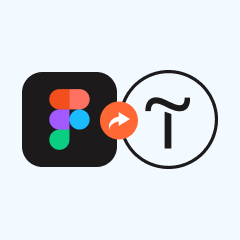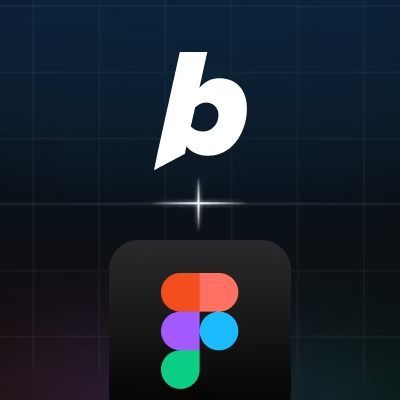Glazed
Alternatives
0 PH launches analyzed!
Problem
Teams struggle to create, access, and understand analytics events due to the technical complexity or the need for endless spreadsheets, leading to inefficiencies in tracking and analyzing data.
Solution
Glazed is a visual tracking documentation tool that converts Figma designs into tracking plans, enabling team members to create, access, and understand analytics events without the need for technical skills or spreadsheets.
Customers
Product managers, designers, and analytics teams who need to streamline their workflow in creating and managing tracking plans from Figma designs.
Alternatives
Unique Features
The ability to turn Figma designs directly into tracking plans, simplifying the documentation process for analytics events.
User Comments
Users appreciate the simplicity and efficiency Glazed brings to analytics tracking.
The integration with Figma is highly valued.
Non-technical team members find it accessible and easy to use.
Improves team collaboration on analytics projects.
Significantly reduces the time to create tracking plans.
Traction
Unable to determine specific traction details such as MRR, user base, or newly launched features from the provided links.
Market Size
The global digital analytics market size is expected to reach $100 billion by 2025.

Figma To Tilda Design Import
Turn Figma designs into a live website on Tilda in minutes
147
Problem
Designers and developers face a time-consuming process when they have to manually transfer each element from Figma to Tilda to rebuild their website design from scratch. This manual process is inefficient, prone to errors, and time-consuming.
Solution
The product is a tool that automates the process of converting Figma designs into a live website on Tilda. Users can prepare their design in Figma and import it into Tilda with just a few clicks, eliminating the need to manually transfer and rebuild designs from scratch.
Customers
The primary users of this product are web designers, web developers, and small to medium-sized business owners who require efficient workflows for turning their Figma designs into fully functional Tilda websites.
Unique Features
The unique feature of this product is the ability to automatically import designs from Figma into Tilda, facilitating a much more efficient workflow by reducing the time and effort required to build websites.
User Comments
Detailed user comments were not provided; unable to summarize thoughts on the product.
Traction
Specific traction details such as version, users, or revenue were not provided; unable to summarize product's traction.
Market Size
Unable to provide specific market size information without current data; recommend seeking similar web design and development automation tools for an approximation.

Tracks To Video — Turn Audio to Video
Turn MP3/Music/Track/Audio to Videos in Seconds!
2
Problem
Users create videos manually by syncing audio tracks with images, time-consuming process and requires video editing expertise
Solution
A video generation tool that uses AI to automatically convert audio tracks and images into YouTube-ready videos, streamlining content creation
Customers
Music producers, DJs, vinyl collectors, and audiophiles sharing tracks visually
Unique Features
Privacy-focused design, output customization without watermarks, tailored for music/audio visualization
User Comments
Simplifies YouTube content creation
Saves hours of manual editing
High-quality output with no ads
Intuitive for non-designers
Privacy assurance appreciated
Traction
Launched 2023 with ~500 Product Hunt upvotes, $29/month subscription, active on platforms like YouTube and Reddit
Market Size
The global video editing software market is projected to reach $3.1 billion by 2027 (Statista 2023)

Figma Tokens Sync for Ant Design System
Synchronize Figma Tokens with Ant Design React project
116
Problem
Designers and developers working on React projects face challenges in keeping the design consistent across the development lifecycle. The manual synchronization of design tokens from Figma into React projects, especially those using Ant Design, is time-consuming and prone to errors, leading to inconsistencies in design implementation and reduced development efficiency.
Solution
Figma Tokens Sync for Ant Design System is a tool that automates the synchronization of design tokens from Figma to React projects using Ant Design. It is built on top of the Tokens Studio (Figma Tokens) plugin and offers integration with version control systems like GitHub, GitLab, and Azure DevOps. This solution allows users to maintain consistency in design across their projects and streamline the development process by automatically updating design tokens in their React projects.
Customers
The primary users of this product are UI/UX designers and front-end developers working on React projects that utilize the Ant Design system. These professionals are likely to be part of software development teams in tech companies, freelancers, or agencies looking to maintain design consistency and improve collaboration between design and development teams.
Unique Features
The unique features of Figma Tokens Sync for Ant Design System include its ability to automatically synchronize design tokens between Figma and React projects, integration with major version control systems like GitHub, GitLab, and Azure DevOps, and its foundation on the advanced Tokens Studio plugin for Figma. These aspects enable seamless design to development workflow, enhancing productivity and ensuring design consistency.
User Comments
There were no specific user comments provided or found during the analysis. Therefore, a summary of user opinions on this tool cannot be made.
Traction
No specific traction data such as number of users, MRR, or financing information was available from the sources provided or found.
Market Size
The global design software market size was valued at $8.92 billion in 2021 and is expected to continue growing, indicating a substantial market for design to development integration tools like Figma Tokens Sync for Ant Design System.

WunderUI - Figma Design System
WunderUI - Supercharge Your Figma Workflow
12
Problem
Users faced challenges in creating digital product designs collaboratively in Figma
Drawbacks: Slow design process, lack of a robust foundation for design creation, inefficiency in streamlining the design workflow
Solution
A collaborative design system tool tailored for creatives in Figma
Core Features: Enhances performance, streamlines the design process, provides a robust foundation for digital product creation in Figma
Customers
Designers, creatives, digital product teams
Unique Features
Collaborative design system in Figma, performance enhancement, streamlined workflow
Market Size
Global design system market was valued at $2.56 billion in 2021

Design System Sync — Figma to Webflow
Sync your entire design system from Figma to Webflow
137
Problem
Designers and developers face challenges in ensuring consistency between design and development phases, leading to time-consuming manual updates and inefficiencies in the workflow.
Solution
Design System Sync for Figma to Webflow is a tool that allows users to sync their entire design system from Figma to Webflow, streamlining the design-to-development workflow. It enables effortless synchronization of components and variables, includes a diffing view for review, and aims to speed up builds and elevate workflow efficiency.
Customers
The primary users of this product are likely to be UI/UX designers, web developers, and product managers involved in the design to development process, looking for a streamlined workflow between Figma and Webflow.
Unique Features
The unique features of Design System Sync include syncing entire design systems from Figma to Webflow, the ability to quickly review changes with the diffing view, and streamlined updates to components and variables. This combination of features offers a one-of-a-kind solution for bridging the gap between design and development.
User Comments
User feedback is not provided.
User feedback is not provided.
User feedback is not provided.
User feedback is not provided.
User feedback is not provided.
Traction
The specific metrics regarding user base, revenue, or version updates for Design System Sync are not available.
Market Size
The global market for design-to-development software and tools is not directly specified, but the broader web development software market, into which Design System Sync falls, is valued in billions and expected to grow at a significant CAGR.

Bolt x Figma
Turn Figma designs into production-ready apps in one click.
683
Problem
Users manually convert Figma designs into frontend code, leading to time-consuming processes and potential human errors
Solution
Figma integration tool that generates pixel-perfect full stack apps from designs via URL modification (e.g., adding bolt.new before Figma URLs)
Customers
Frontend developers, product managers, and startup teams needing rapid prototyping
Unique Features
One-click conversion of Figma frames to production-ready apps with backend integration
User Comments
Saves weeks of development time
Eliminates manual coding errors
Intuitive URL-based workflow
Supports full-stack requirements
Ideal for MVP creation
Traction
Newly launched (Oct 2023), ranked #1 Product of the Day on ProductHunt with 500+ upvotes
Market Size
Global low-code development platform market valued at $22.5 billion in 2023 (Gartner)
Problem
Users manually convert Figma designs into JSON with design tokens for AI integration, which is time-consuming and error-prone due to inconsistent token resolution and structure.
Solution
A Figma plugin that lets users export designs as AI-ready JSON, enabling direct integration with tools like ChatGPT or Cursor via structured data and resolved design tokens.
Customers
UX/UI designers, front-end developers, and AI developers needing to convert designs into structured data for AI-driven code generation.
Alternatives
View all Figma Raw alternatives →
Unique Features
Automatically resolves Figma design tokens into structured JSON, ensuring consistency for AI model input and code generation.
User Comments
Saves hours on manual JSON conversion
Seamless ChatGPT integration
Design-to-code accuracy improved
Essential for AI-driven workflows
Simplifies token resolution
Traction
Launched May 2024, featured on ProductHunt with 1.4K+ upvotes, used by 5K+ Figma users, founder @vaultdeveloper has 1K+ X followers.
Market Size
The global design-to-code tools market is valued at $850 million (2023), driven by demand for AI-integrated design systems.

html.to.design 3.0
Convert any website into fully editable Figma designs
113
Problem
Designers and developers face difficulties in converting existing website designs into editable formats for redesign or improvement, leading to increased time and effort in the design process. Converting existing website designs into editable formats
Solution
html.to.design 3.0 is a Figma plugin that allows users to convert webpages into editable designs directly in Figma, streamlining the design process by incorporating user feedback and introducing new features for a more efficient workflow.
Customers
Web designers, UX/UI designers, and front-end developers who work on website redesign or improvement projects and seek efficient ways to import and edit existing web designs within Figma.
Unique Features
The unique aspect of html.to.design 3.0 is its ability to seamlessly convert any website into fully editable Figma designs, directly incorporating changes and improvements into the design workflow.
User Comments
User comments are not available.
Traction
Traction details are not available.
Market Size
Data not available

Practical UI - Figma Design System
Figma design system and UI kit
499
Problem
Designers and developers often struggle with creating visually appealing and functional user interfaces due to the lack of a unified system, leading to inconsistencies and increased development time. The main drawbacks include lack of a unified system and increased development time.
Solution
Practical UI is a Figma design system and UI kit that offers a wide range of design components and tools, all centralized within Figma. This allows users to create accessible and usable designs efficiently. Key features include a comprehensive set of UI components, accessibility features, and usability enhancements.
Customers
The primary users are web designers and developers, particularly those engaged in UI/UX design and development who need efficient tools to create consistent and accessible interfaces.
Unique Features
Focus on accessibility and usability, comprehensive integration within Figma, and a wide range of customizable components.
User Comments
Not available
Traction
Not enough data available
Market Size
The design system tools market is significant, as emphasized by the proliferation of UI/UX development teams in tech. No specific data available, but the related UX/UI tools market is burgeoning.

